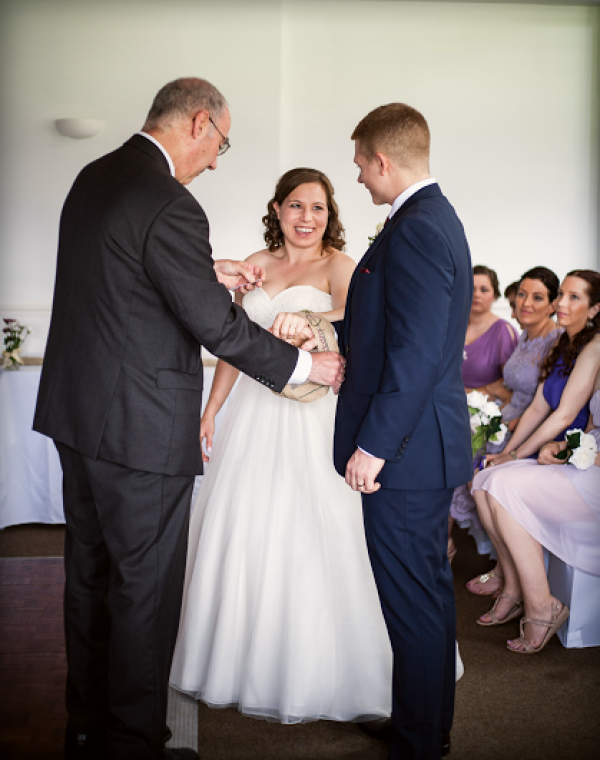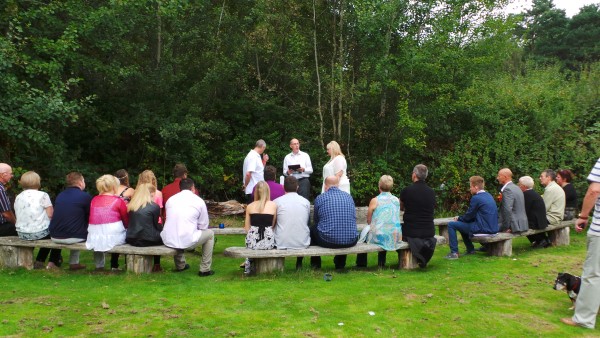by Michael | Feb 14, 2017 | Blog
Valentine’s Day – well, it’s all about romance, isn’t it?
Visions of romantic, candle-lit dinners. Scores of love-struck Romeos on their knees proposing marriage to their beloved. It’s a magical time.
It’s a wonderful time for chocolate-makers, florists and restaurateurs too, that’s for sure! And maybe for civil celebrants?! But is it so great, for the wannabe fiancé?
By mistake I published my Valentine’s Day blog a week early (did you read it?!). Consequently, I’ve been forced to think of something else for this week! I’ve come up with a fable (well, a true story, actually).
Proposals
I wondered how many people do choose this day to propose to their intended.
Long ago, in the mists of time, I got down on bended knee in front of my bewildered girl-friend and asked her to marry me. A little to my surprise, she accepted me, and more than 18 years have elapsed since then. But, despite the result, things hadn’t gone as I had planned.
A salutary tale
I had been working in Italy, and had arranged that my girl-friend should join me in Rome. We would spend a few days together sightseeing (she thought she’d be shopping – her first surprise!).
We had been together for a year and a half, and this would be my chance to propose to her. But what if she were to say no?
I had originally chosen the Piazza Navona on the second evening for my proposal. When we got there, it was atmospheric, but crowded and busy, and it didn’t seem right.
How would the remaining days of the holiday be, if I were rejected then? No, better put it off to the last night. Yes, that was it. Wait as long as possible.
The next day, we travelled outside Rome to the Villa d’Este, in Tivoli. The gardens are spectacular, terraced, with fabulous fountains at every turn. We had chosen a beautiful morning and, for some reason, had the place almost to ourselves. (Apart from stray cats.)
As I knew I wouldn’t be proposing for a day or two, I was relaxed, and before I knew what was happening, I had done the deed. Quite easy, actually!
The right answer was vouchsafed, and I would be walking on air for the rest of our stay and, indeed, for long afterwards.
The moral of the story
So what is the point of my confession?
I would advise anybody planning to propose to take on board what I learned.
You don’t have to pre-plan when to propose – and, if you’re nervous like me, it is better to let the moment happen. If you pre-determine the moment, you will get uptight. It may spoil your dinner, or holiday, or whatever. You may even miss the opportunity altogether.
Trust that the opportunity will arise.
By all means, propose marriage on Valentine’s Day – just, don’t do it because it’s Valentine’s Day!

by Michael | Nov 15, 2016 | Blog
A cautionary tale. It’s about a marriage that was not to be!
In September, I received an e-mail from Ukraine asking if I was available in January to celebrate a London wedding. They had a date, expected guest numbers and a start time – yet, no venue (something I immediately thought odd). Moreover, my correspondent claimed to be called Edward (although his address didn’t quite match this). Furthermore, even though the implication was that he was English-speaking, he clearly wasn’t.
The bride (called “Marry” – more than odd, I thought) was supposed to be his cousin and Edward claimed the couple were English. Anyway, Edward agreed my terms, so I e-mailed my contract for the couple to sign. This was returned with a printed “X” rather than any name. I sent it back and asked for an actual signature, but this was ignored.
I asked for the couple’s details, and I received some. I have not ascertained whether these were genuine. (The address was, as I happen to know, on Kiev’s main avenue. This was the equivalent of London’s Oxford Street, but I guess that people might just live there.)
I told Edward that the payment I received must be net of bank charges or commissions etc. He said he had an uncle over here, who would send me a Sterling cheque, so this would obviate that problem. Promise followed promise, but no cheque came.

Finally, after about a month had elapsed, another e-mail came through promising me a cheque for £1,850. (Rather more than I charge for a ceremony!) I wrote back at once, telling him I was expecting £300 only (for deposit plus a bit). However, the cheque for £1,850 arrived the next day, mailed from England. Edward e-mailed, saying there had been a mistake and the sum was for me AND the photographer. I should cash the cheque and, when it cleared, pay the photographer, whose details he would send me.
This might just have been plausible, but the cheque was a company one from BUPA (bona fide, I am sure), but signed with a stamp, not a hand-written name.
I suspected that the money had been taken illegally from BUPA. Presumably, the “photographer” I was to pay over £1200 to was actually Edward or an associate.
I shared my opinions with the police Fraud squad, and they told me to ignore all future communication with Edward, and they would share their findings with me in due course (in, at least a month, possibly). I had two dismayed e-mails from Edward, and then nothing since. (I have not heard from the Fraud squad, but am now sure that my suspicions were correct.)
A sad story, and I’m only relieved that things didn’t turn out worse than they did. I wasted time on, and was disappointed in, a potentially valuable order. But who knows what I might have found myself immersed in, had I cashed the cheque and paid the “photographer”!

by Michael | Sep 6, 2016 | Blog
Why marry? It’s pretty easy to live with someone you love without getting wed. Marriage is all a lot of bother and expense and (depending on your viewpoint) mumbo-jumbo.
Here’s one comeback: tax and inheritance advantages of marriage. They are not to be sneezed at. However, if that’s your only motivation for marriage, then I’m not going there.
Cohabiting
There is one great reason for living together. Because you have no legal ties, there is less pressure on you both. You can make your own rules and freely agree how to deal with finances and accommodation. Indeed, the option to marry later will always exist.
If the relationship does break down, you can both walk away – maybe, easily; though not always.
It can get messy if children are involved.
Marriage
Marriage really should be a commitment. That makes it hard. By definition, committing to another person means you are promising to share what is yours (as well as what is theirs).
It means making concessions, respecting and listening to each other.
It means making your relationship a fortress – you absolutely have to ensure that you are better together than apart. You have to present a united front to all life’s challenges.
To do this, you need to understand each other and accept to differ at times, but calmly and even lovingly.
Building that ‘fortress’ should apply to couples who are cohabiting too. But without the force of the law behind them, there may be fewer incentives to achieve this.
Legalities
Having a legal binding to your relationship makes it feel harder to break out. That can be a bad thing, as some couples stay together in a toxic relationship and inadvertently damage their children.
What’s good about it is that it may encourage couples to work at their relationship. It’s all too easy to give up when sometimes all that’s needed is patience and a readiness to talk and work through the difficulties.
The Wedding
At a marriage (whether it be a regular full religious wedding, a standard register office ceremony or a bespoke civil ceremony), the couple normally are committing themselves publicly. They may repeat standard words or recite specially composed ones. Either way, they are aware of the significance of what they are promising. The fact that they are declaring this in front of (at least) their closest family and friends makes it especially significant. It gets the marriage off to a flying start.
A personal viewpoint
My wife and I lived together for a couple of years before marrying. Had that not been a success, we would not have proceeded. Going through with the ceremony underlined the fact that we were determined to make our relationship work.
We have had our moments, of course, but have worked through them (so far!). We’re looking ahead to our next anniversary, which will be our 18th. Maybe, had we stayed unmarried, but cohabiting, we’d have reached this position too. I can’t say.
All I know is that, apart from adoring our wedding day, we have no regrets about going down the marriage route. It may be old-fashioned, but that doesn’t invalidate it. We certainly recommend it to others.
Yes, it takes hard work, but the rewards are priceless.
Cover picture source: http://leerushby.com

by Michael | Jul 26, 2016 | Blog
What do you think of, when you’re planning your big day? Is it the celebrations afterwards? Maybe it’s the location, catering, guests and a great band. But haven’t you forgotten something rather important?
What about the ceremony itself?
That’s really what the day is all about, so let’s look at how we can make the most of that.
There’s no choice
People believe that the ceremony has to follow a set formula. It’s either a full religious or a register office service, surely? Well, no, not necessarily.

Supposing you don’t relish much (or any!) religion in your ceremony? Supposing you want something more than the rather sterile register office wedding that is the same for everybody? Maybe you want an unusual venue – outdoors, perhaps. Then consider a celebrant. He or she will be able to work with you, suggest readings, music and rituals, and help you build exactly the service that you choose – from start to finish.
The celebrant can’t do the legal bits – you still need the registrars for that, but you can accomplish that at the register office a day or two before, or else, if you’re using a licensed premises, the registrars will come along, and you can have your bespoke, celebrant-led service after the legal part.
3 important points
When considering a celebrant, there are three areas to pay special attention to:
- Beliefs – you may want to compromise, of course (your parents may be paying for your wedding; you may be a mixed-faith couple etc.), but you only need to include as much religious/spiritual content as YOU WANT. It is your event, after all!
- Planning – work together (as a couple) with the celebrant to ensure the rituals you would like are included. You have input into everything from readings to readers, choreography, rituals and music.
- Time – don’t underestimate how long it may take to construct the perfect wedding (and that goes for the celebrations too).
To summarise:
- Work together as a pair (good practice for your married life!) and decide what you really want for your wedding. Remember it is YOUR day, although be prepared to compromise a little.
- Do work with your celebrant to come up with the ceremony that will be most meaningful.
- Start the process early.
- Look forward to a most wonderful day!!
Cover photo courtesy of www.leerushby.com
by Michael | Jun 21, 2016 | Blog
My job is to marry people. My ceremonies usually include advice and suggestions for making the marriage a success. How much the couples remember of my words, especially with all the other big day distractions, I don’t know, but at least they will have the wedding script that I send them, and there may be a video. Thus they are able to revisit my words.
So what do I, a civil celebrant, know about marriage, successful or otherwise?
I have gleaned quite a lot of experience from my own marriage (we are approaching 20 years together) as well as those of my circle. I do see a number of my friends in unhappy or broken marriages. I read a lot. And I know that there are plenty of statistics that bear out the truism that you have to work at marriage.
I’d like to look at one area that can certainly damage a marriage.
Stress
A marriage can be damaged by jealousy, finances, differing life styles, health issues, sex, in-laws, infidelity … the list goes on.
How should you react to stresses like these?
One surprising answer is to take care of yourself.
If you are going to address your relationship issues with clarity, you need your mental and intuitive faculties to be in balance.
You also need to be aware that you are part of a two-way relationship.
Solutions
The habit of meditation can produce a calmer mind-set. Another useful thing is taking time-out. “I don’t want to react stupidly, so I’m leaving the room for a moment to think about my reply.” Ten seconds out before riposting, can be very valuable.
In more serious cases, you need to be able to manage your reactions. Keeping calm and being reasonable (rather than flying off the handle unthinkingly) can be so beneficial. Discussion, give and take, listening to the other are all techniques that can help resolve crises successfully.
Sometimes there may be a problem that is (inadvertently, or not) of your causing, and if it can be acknowledged, it will be easier to resolve. Often there is a major misunderstanding, which, once expressed, becomes trivial.
If you’re upset with your partner, your tendency may be to avoid him/her, but it can be useful (particularly if you share a pastime) to spend some more time together. I don’t mean sitting in the same room, posting on FaceBook or playing electronic games, but doing things where you interact. You may have to schedule actual dates, but showing your partner that they are a priority can only be to the good.
Remember that it is so much easier to talk to and understand your partner when you are calm and centered.
You have the tools and skills to handle whatever may transpire in your relationship, and this should give you the confidence that you can enjoy a happy, long-term marriage. Combine it with love, and you will have every reason to anticipate a wonderful marriage!



